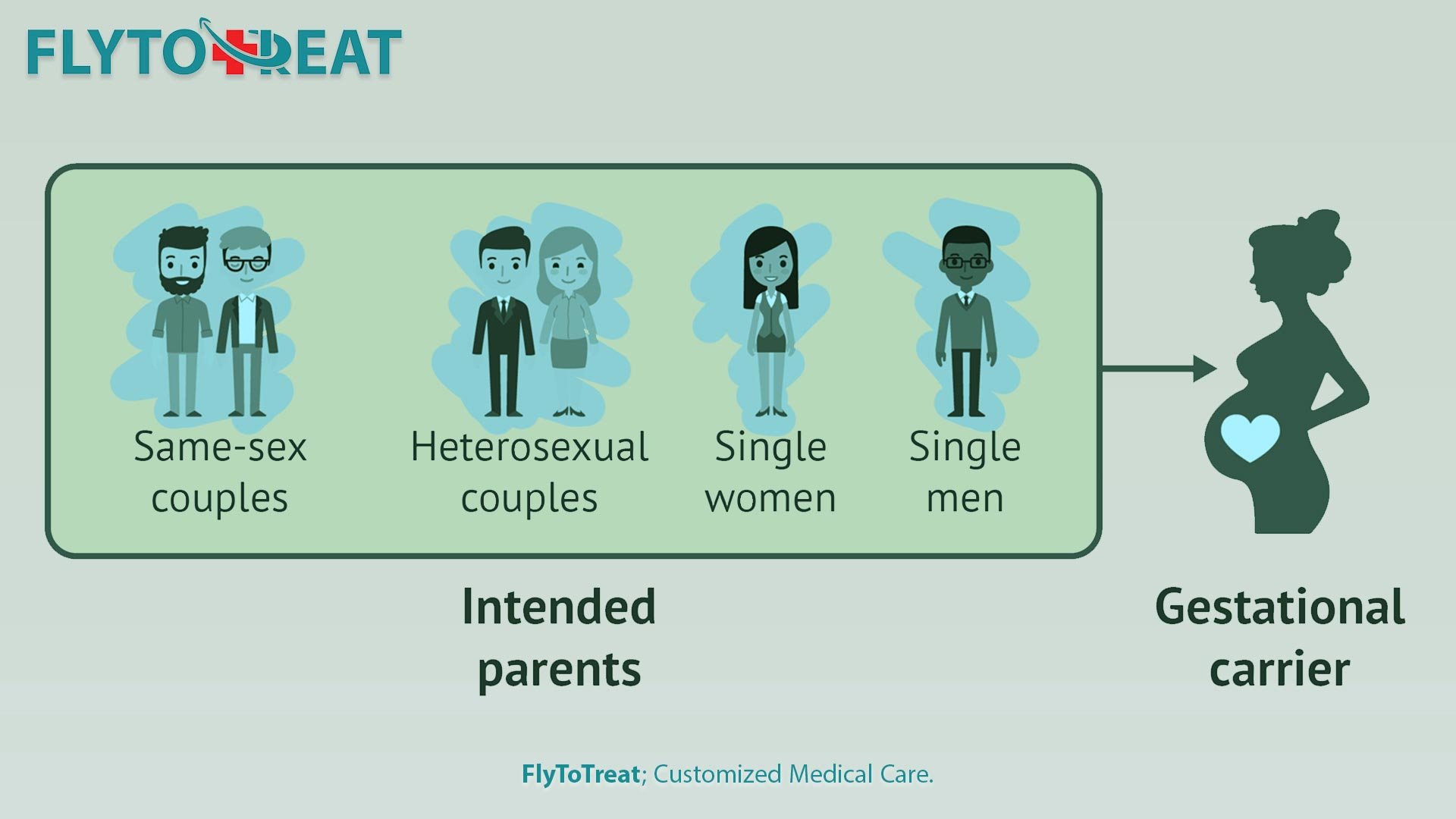
What is Surrogacy? The Procedure, Regulations, Religious attitudes and Costs
Most couples want to have children a few years after they start living together. Unfortunately, pregnancy cannot happen for every couple and some of them may need to seek medical treatments. There are different types of medication for infertility treatment. In some cases, the use of hormonal drugs can be a useful solution. According to the doctor’s recommendations, some couples may turn to use assisted reproductive technologies like IVF, egg donation, etc.
However, sometimes after using the help of reproductive technologies, they face recurrent miscarriages, which can lead to more anxiety and frustration. Surrogacy is one of the assisted reproductive technologies that involves another woman carrying the baby for someone else. Women who do not have a suitable uterine environment to grow the fetus can use surrogacy.
What is surrogacy?
Surrogacy is one type of assisted reproductive technology (ART) in which a woman agrees to carry another couple’s fetus in her womb until the baby is born. In this process, the birth mother is merely the carrier of the baby and gives full custody and parental rights to the intended parents. Surrogacy has complicated legal and medical steps that should be met wisely. It is very important to seek professional advice and have a support team to lead you the way through the medical and legal steps.
Types of surrogacy
The surrogacy process can be divided into two major categories: Traditional surrogacy and Gestational surrogacy.
Traditional or partial surrogacy: in this type of surrogacy, the surrogate provides her own eggs to be inseminated with the commissioning father’s sperm and then be implanted into the surrogate’s uterus. Since the surrogate is the biological mother of the child, more caution should be applied to prevent future legal issues.
Gestational or host surrogacy: in this method, the fetus is inseminated in a laboratory by the egg and sperm of the original parents and then it is transferred into the uterus of the surrogate. The surrogate mother has no biological connection with the embryo and she is only the carrier of the baby until the baby is born.
However, by the terms of charges and fees, we can divide surrogacy into two kinds of arrangements, which are altruistic surrogacy and commercial surrogacy, and each of them can fall under either the traditional or gestational type.
- Altruistic surrogacy: in this type, the surrogate is not economically beneficial and is not paid more than the medical expenses. The surrogate can be one of the patient’s relatives or friends who undergoes the pregnancy process only for humanitarian purposes.
- Commercial surrogacy: in this type of surrogacy, the surrogate is economically beneficial and receives payment and compensation for her service. The commercial surrogate can be a total stranger who agrees to do the process and deliver the baby to the intended parents in exchange for receiving money.

Who Needs Surrogacy?
Surrogacy is an option for those who tried a variety of medications and assisted-reproduction techniques like IVF and still could not get pregnant. Surrogacy can also help couples who cannot adopt a kid because of their age or marital status. Common reasons for considering surrogacy are:
- Severe abnormalities of uterine structure like uterus myoma or fibroids and uterine polyps
- Removal of the uterus due to hysterectomy
- Severe and untreated uterine infections
- Recurrent miscarriages
- History of repeated IVF failures
- A medical condition that prevents pregnancy or makes it risky, such as cancer, cardiovascular disease, or diabetes.
- The risk of transmitting the embryo a genetic disease
- Gay couples
Surrogate’s Requirement and Qualifications
The conditions of eligible surrogate mothers may be slightly different in clinics, but in general, the most important features required for this process include the following:
- Age: One of the most important characteristics of surrogate mothers is their age. These people must be over 20 years old and not be in menopause ages. The average age for this process is between 20 and 45.
- History of childbirth: Surrogates must have a history of at least one successful pregnancy and the number of her deliveries should not exceed five vaginal and two cesarean deliveries.
- Physical and psychological tests: The person should be evaluated mentally and physically and has no history of underlying diseases or pregnancy problems. The surrogacy journey is demanding, so it requires the stable psychological condition of the surrogate.
- Lifestyle: Surrogate mothers should have a calm and comfortable living environment during the 9 months of pregnancy. They need to avoid smoking and using alcohol.
- Signing necessary contracts: The surrogate mother must know her role and responsibilities towards the fetus and sign the essential legal contracts. She should also be receptive to the fetus's genetic parents during pregnancy.
How is the Surrogacy Process?
- Initial screening: In the first stage, the biological parents and surrogate mother refer to an infertility specialist for initial tests and ultrasound.
- Supplementary counseling and evaluations: Before starting the procedure, it is best for parents to have supplementary counseling with a social worker to make sure they are mentally prepared for the procedure. In this meeting, all relevant questions can be asked.
- Genetic counseling: One of the most important things to do before starting a surrogacy procedure is genetic counseling for the surrogate and parents.
- Legal issues and formal contracts: One of the main concerns of parents during the surrogacy process is legal issues after the baby is born. Having legal counseling and signing legal contracts can alleviate parental concerns.
- Using the assisted reproductive technologies: At this stage by using certain medications, the mother's ovaries are stimulated to produce eggs and these eggs are removed through egg retrieval (puncture) procedure to be fertilized in the laboratory using methods such as IVF. Then the resulting embryo is transferred to the surrogate mother's uterus.
- Pregnancy care: During pregnancy, routine screenings and doctor appointments should be carried out to make sure about the safety of the pregnancy process and the health of the fetus.
- Giving birth and delivering the baby to the parents: giving birth completes the process of surrogacy and the baby is delivered to its biological parents.
Religious Views on Surrogacy
Every religion has different attitudes towards using assisted reproductive technologies (ART) including surrogacy. In this section, we are going to take a look at the religious points of view regarding the surrogacy process and its restrictions in Christianity, Islam, Judaism, Buddhism, and Hinduism.
Surrogacy in Christianity
Just like all religions, there are diverse perspectives regarding ART and surrogacy. In Catholicism, even though surrogacy is pointed out by the story of Sarah and Abraham, the Catholic Church does not advocate this process. The church teaches that children are gifts from God and they should only be conceived and carried naturally by a married couple. They believe that any interference of a third party in this process is immoral.
In Protestantism, there are different views towards surrogacy practice due to different fractions of Protestantism. However, they are usually more liberal towards using assisted reproductive technologies. Some Christian theorists argue, “Ownership of a child is in contrary to the child’s dignity and nature. For this reason, the child has the right to be the fruit of the specific act of conjugal love between his/her parents”. On the other hand, some others encourage surrogacy by saying that fertility “is a blessing to be shared”.
Surrogacy in Islam
In the surrogacy process, the surrogate may not be biologically related to the child depending on the type of surrogacy. This issue causes Islamic scholars to have different views about the surrogacy procedure.
Some of scholars debate that traditional surrogacy is not allowed because the surrogate is the biological mother of the child and has responsibilities towards the baby as their mother. This group of scholars argues that this kind of surrogacy is a type of adultery because the surrogate had her egg fertilized by the sperm of a man who is not her legal husband.
Some other scholars believe that traditional surrogacy is allowed in Islam because there is no relationship between the man and the surrogate, and it is used only for giving birth to a child. They argue that this method is used on the principle of “Maslahat” or public interest to save a family and the surrogate will not be engaged in adultery. This group of scholars compares surrogacy with hiring a woman to breastfeed a child which was an acceptable practice in the history of Islam.
Most of scholars permit the gestational type of surrogacy because the egg and sperm of the biological parents form the embryo, and it is transferred to the surrogate’s uterus only for growth. In this type, the surrogate mother has no biological connection to the child. These scholars refer to a verse in the Quran that says: “…their mothers are only those who conceived them and gave birth to them (Surah Mojadeleh, 2).” According to this verse, the intended parents are responsible for the baby because they are the biological parents.
Surrogacy in Judaism
Conservative Jewish religious thinkers may not advocate surrogacy. Yet, more liberal religious thinkers may accept the surrogacy process as a way to ease the suffering of infertile couples. The important issue in Judaism is the heritage of religion through the mother; it means the child would be considered Jewish if the mother was Jewish. However, in Reform Judaism, this cannot be an issue because they believe only one parent should be Jewish. Therefore, if the father is Jewish, then the mother’s religion is not important. They discuss if the surrogate is Jewish, the child has the same religion as well.
Surrogacy in Buddhism
Buddhism is a liberal religion in using assisted reproductive technologies (ART) including surrogacy. In Buddhism, using donor eggs and donor sperm is not only legal for married couples but also all people. Surrogacy is also totally accepted in this religion. The important reason is that procreation is not considered a moral duty. Therefore, couples are under no obligation to have children and when they want to have children, they can do it in whatever way they wish.
Surrogacy in Hinduism
Hinduism has a liberal point of view towards using reproductive technologies. They agree with most types of fertility treatment but it is preferred that the gametes come from a husband and wife. Using donor sperm is also accepted in case the sperm comes from a close relative of the husband. Surrogacy in India is an industry in progress and many Indian surrogates are Hindus.
Surrogacy Condition in Other Countries
The process of surrogacy is taking place in many countries without a law being regulated in this regard. In a few countries, the governments have regulated laws to ban the surrogacy process. These countries include France, Italy, Austria, Norway, Sweden, Spain, the Netherlands, and Germany.
In countries such as the United Kingdom, Australia, and Canada, surrogacy happens legally but altruistically and free of charge. In previous years, India was one of the leading countries in the field of surrogacy, but according to the laws enacted in December 2018, this treatment is available only for residents of India and is not done internationally. Iran has no strict laws towards surrogacy and it is now a popular destination for couples who need surrogates.

How much does surrogacy cost?
The cost of surrogacy varies in different parts of the world depending on the destination country. The costs also vary based on the arrangement. The total cost of this procedure include:
-
Costs of infertility treatment such as IVF and ICSI.
-
Embryo transfer to the surrogate or artificial insemination
-
Donor eggs or sperm
-
Surrogate compensation and payments
-
Social works
-
Legal counseling
-
Screening
-
Travel costs if the destination is not your hometown
-
Agency fees (for those who take advantage of a surrogacy agency which is highly recommended)
Cost of Surrogacy in Iran
Iran is a very popular destination for surrogacy in recent years. It is mostly due to the professional services and the most affordable costs in Iran. The cost of surrogacy in Iran is from 12000$ to 15000$ depending on the type of surrogacy, the surrogate, the agency, etc. Surrogacy in Iran costs are incredibly reasonable compared to other countries.
Cost of Surrogacy in Ukraine
Since Ukraine legitimized surrogacy in 2002, it is now a popular destination for couples seeking affordable surrogacy services abroad. The demands for receiving this medical service have increased when Thailand, India, and Nepal banned commercial surrogacy. The average surrogacy cost in Ukraine is about $30,000 and it is available for heterosexual married couples.
Factors Effecting on the Surrogacy
-
Healthy sperm and eggs: Having healthy sperm is crucial to the success of the surrogacy method. Whether using donor sperm or the couple's sperm, they must pass several tests and be examined for their health. The age of the egg donor is more important than the age of the surrogate mother because the embryo is not genetically dependent on the surrogate mother. The ideal age for an egg donor is between 21 and 29.
-
Surrogate mother: The surrogate must already have a history of a healthy and successful delivery. The age of the surrogate mother is also important in the success of this method and therefore the age range of 21 to 37 years is recommended.
-
Fetal quality: It is best to have the necessary genetic testing (PGD) before transferring the embryo to the surrogate mother’s uterus in order to identify chromosomal abnormalities that could lead to a failed fetal implantation or miscarriage.
-
Proper weight: The egg donor and the surrogate mother had better have a balanced weight and not be overweight or underweight.
-
Choosing an infertility clinic or a professional facilitator company: Due to the pressures and psychological stress imposed on both parties during surrogacy treatment, choosing an experienced clinic or agency to facilitate the medical, non-medical, and legal process is very important. FlytoTreat, with its professional support, compassionate companionship, and extensive experience in legal matters and child custody, can provide valuable assistance to parents and surrogate mothers.
-
Healthy lifestyle: Having a healthy lifestyle and not using drugs and cigarettes is very important for the surrogate and donor mother. Smoking can drastically reduce success rates. Avoiding stress and having a peaceful living environment help a healthy pregnancy and delivery.
-
Getting the Essential Vitamins: According to research, deficiencies in some vitamins, such as vitamin D, can affect the outcome of IVF. Consulting a doctor and taking the right supplements will increase your chances of a successful pregnancy.
MEDICALLY REVIEWED BY: Dr. Ali Bazazi
AUTHOR: Leila Nazari
27 June 2023 - Updated At: 06 January 2025
Related Articles
مرحبا أريد الاستفسار حول تأجير الرحم، لأنني قمت بعنلية استئصال رحم في 2014 ما هي الشروط , تكلفة و ثمن العملية و شكرا
Comment




